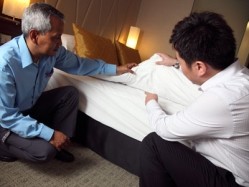How to deal with bed bug infestations quickly and effectively

As the Airways Hotel in Victoria witnessed through a series of damning reviews on TripAdvisor, bed bugs can cause long-term damage to a hotel’s reputation in addition to the loss of repeat bookings.
Increasing travel, resistance to some insecticides and a wide range of infestation sources means the prevention of bed bugs entering hotel premises is almost impossible, while research by the National Pest Management Association (NPMA) and the University of Kentucky in August last year suggests the world is on the verge of a ‘bed bug pandemic’.
“Having worked closely with hotel customers across the world, I’ve recognised a tendency in the industry to underestimate the problem of bed bug infestations. It’s the problem no one really wants to talk about. This in itself could be compounding the problem,” said Savvas Othon, technical director at pest control specialist Rentokil.
“One of our core beliefs when it comes to bed bugs is that just because bed bugs are not a problem for you today, it does not mean that they will not become a problem tomorrow. It is this awareness – or lack of – that poses the real barrier to bed bug management.”
Having a bed bug treatment protocol in place before an infestation occurs can be the key to dealing with a situation effectively, reducing the risk to reputation damage and guest unsatisfaction.
How are bed bugs spread?
Bed bugs can enter a hotel through a guests clothing or luggage, or even on second hand or antique furniture. Once established, they are capable of reproducing rapidly, laying up to 300 eggs in two months. It only takes 10-12 weeks for an infestation to reach a state that is noticeable by guests, but bed bugs can live for up to a year without a blood feed.
How to detect an infestation
Bed bugs are not confined to between the sheets but can be found in any nook and cranny in your hotel. They have been found to exist in the seams of mattresses, headboards, linen storage areas, carpets, underlay, skirting boards, electrical sockets and floorboards.
However the warmth of human bodies, the carbon dioxide we exhale and the creatures’ nocturnal nature mean bed bugs are mostly active around beds at night and lay dormant in cracks and crevices during the day.
There are several tell-tale signs indicating you have a bed bug infestation, including small blood spots on sheets; faecal pellets; cast skins; a distinctive sweet and sickly smell; and dark or black staining of mattresses from bed bug extreta.
How to deal with the problem
“As with all pest control issues, if you do experience an infestation, you need to respond decisively, quickly and with minimal disruption to your customers and employees,” advises Othon. “Containing the problem calmly is the priority.”
In the first instance of a bed bug problem arising, operators must ensure housekeeping are aware of signs of bed bug infestations and thoroughly inspect the room in question. If it has been recently cleaned, any hoovers or cleaning equipment must be vacated from the premises immediately and inspected for signs of bed bugs.
In addition to offering the guest another room to stay in, operators must make sure guests only take their personal belongings with them – nothing else should be removed from the room and all staff must be prohibited from entering.
Front of house managers should be trained to deal with such situations if they arise and have a thorough knowledge of bed bugs so they can deal with guests effectively.
“It is here that having a thorough understanding of bed bugs can really help you alleviate the issue when dealing with guests. You need to show distressed customers that you fully understand their concerns and communicate that you are dealing with the matter effectively.”
Othon recommends management empathises with the customer’s situation, record in detail what the customer has experienced, arrange a doctor’s visit if required, advise the guest of any side effects of bed bug bites and offer to wash any of the guests clothes or belongings.
Operators must then contact a specialist pest control company to inspect the premises and treat the problem immediately.
“Ultimately, pests of any type are bad for business,” adds Othon. “Proactive pest control is important for hotels not only because of their vulnerability to pest threats, but also because of the impact those pests can have on the reputation of your hotel.
“At the centre of bed bug management, however, remains raising awareness and constant vigilance right across your business to prevent infestations or detect them in the early stages. Partnering with a professional pest control company to help you deliver this also means that hotel managers can leave them to manage these threats, so they can focus on running their hotels successfully.”



























